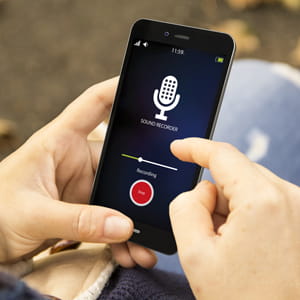
CONVERSATIONS with patients about their treatment can sometimes involve complex information in which important details may be missed or misunderstood. This is often cited as a reason why patients may record consultations using a smartphone or other means, even without the clinician’s knowledge. With the increase in remote telephone and video consultations due to the pandemic, it’s even easier for patients to do so covertly.
Discovering this can be unsettling and may make you feel that it is being done with bad intentions or to "catch you out". However, it’s important to understand the reasons why a patient may want to listen again to what has been said in a consultation. It may be to help them remember important details or understand the information being given – and ultimately enhance decision making about their ongoing care.
Personal patient information
Health professionals continue to express concerns about how discovering that a covert recording has been made can impact the doctor-patient relationship, possibly diminishing trust. This is an understandable reaction. It may make you feel that your privacy has been violated, and we are often asked at MDDUS whether this warrants ending the therapeutic relationship with a patient.
The short answer is that there is no legal basis to prevent a patient from recording their own consultation. The Data Protection Act 2018 classifies consultations as personal patient information, which can be used for their own individual purpose (hence, patient consent is required if the clinician wishes to make a recording). Removing a patient from a practice list on the basis of this issue alone would breach NHS contractual obligations and would not comply with GMC guidance on appropriate steps to take in ending a therapeutic relationship.
Patient benefits
We encourage members to embrace the idea that patients may want to record their consultations for valid personal reasons, and to discuss those reasons. Showing your patients that you are willing for them to make a recording may encourage them to be more open and offer prior notice when they intend to record an encounter.
Among reasons that patients cite for recording consultations are:
- a desire to accurately capture everything you are telling them
- to be able to later listen back to the conversation after they have had time to think more about it
- to play back the recording to a family member or close friend in order to discuss the treatment or other options.
Changes put in place as a result of the pandemic mean that patients may be less able to have someone else present during an appointment, either face to face or remotely. Recording the consultation offers an alternative, allowing for review at a later time.
Proof of standards
There are of course situations when a patient may decide to make a recording because they feel a doctor is acting unprofessionally or inappropriately – and this may be used as evidence in a complaint or claim. An audio or video recording in such circumstances can be of benefit in that it may provide an accurate account of what took place in a consultation – proof that normal professional standards were maintained.
Shared decision making
The GMC has recently updated its guidance for obtaining patient consent through a shared decision-making process. Decision making and consent highlights "the importance of meaningful dialogue, personalised communication about potential benefits and harms, and how doctors can support patients to make decisions with them about treatment and care".
The emphasis is very much on patient choice and focusing discussions around treatment and procedures depending on patient circumstances. What’s important to one patient may not matter to another. Paragraph 17 of the guidance states:
"You should try to find out what matters to patients about their health – their wishes and fears, what activities are important to their quality of life, both personally and professionally – so you can support them to assess the likely impact of the potential outcomes for each option."
Being understanding of a patient’s wish to record their consultation may in fact enhance this process.
Covid-19 has had a massive impact on how clinicians normally communicate with patients. Remote consulting will be a new concept to many and therefore it should be no surprise that with the ubiquitous use of video-enabled smartphone devices more patients may choose to record their own consultations.
ACTION POINTS
- Try to understand why your patient may want to record their consultation.
- Actively encourage patients to speak to you if they feel making a recording would be helpful.
- Read through the GMC’s updated guidance on decision making and consent.
Kay Louise Grant is a risk adviser at MDDUS
This page was correct at the time of publication. Any guidance is intended as general guidance for members only. If you are a member and need specific advice relating to your own circumstances, please contact one of our advisers.
Read more from this issue of Insight Primary

Save this article
Save this article to a list of favourite articles which members can access in their account.
Save to library
